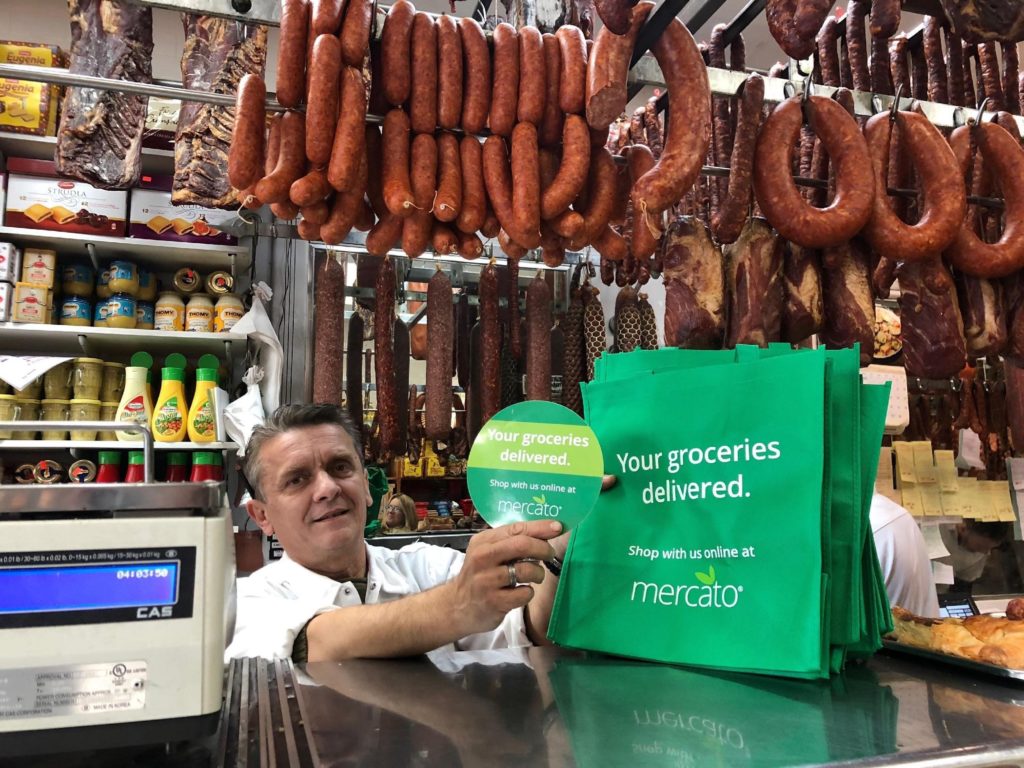Startup Spotlight: Mercato
Jun 17, 2019 - Sarah Lubeck
Expanding your business to San Diego? Everyone is doing it. From startups, such as Cloudbeds and Wrike, to major companies like Amazon and Walmart Labs , San Diego has made a name for itself as a modern, livable region where companies can find the best and brightest workers. And if expanding wasn’t enough, some big names – such as Teradata – have even made the decision to shift major operations and headquarters to San Diego.
One of the latest startups to join the San Diego HQ club is Mercato, an online ordering and delivery platform for independent grocers. Through Mercato, Founder and CEO Bobby Brannigan is leveling the playing field for small businesses by connecting 650 independent grocery retailers directly to customers.
For Brannigan, the decision to start Mercato was personal. Growing up in his father’s neighborhood grocery store in Brooklyn, Brannigan saw firsthand the long hours that went into keeping the lights on, so he created a solution to help.
This isn’t Brannigan’s first foray with San Diego. In the early 2000s, he built textbook startup ValoreBooks in San Diego. When the time came to expand Mercato west, Brannigan knew San Diego was the right spot to help him find top talent and scale his platform. In April, the company doubled its staff, and it plans to up its employee count even more in San Diego over the next few years.
We sat down with Branningan to learn more about Mercato, its plans for growth and why San Diego is key to its growth. The following interview has been edited for length and clarity:

Tell us about Mercato. What problem are you solving?
Mercato was created to help independent grocers compete with local and national grocery chains in online ordering and delivery. Independent grocers are at a huge disadvantage in terms of people, technology, and money. As a result, they are being squeezed in every direction. Mercato is trying to level the playing field by giving these merchants access to world-class tools such as eCommerce services, marketing support, customer analytics, local delivery, product recommendations, and more.
Why did you start Mercato?

My father owns a neighborhood grocery store in Brooklyn, New York. As a kid, I learned the systems of the store. Sales and inventory management were primarily tracked on paper. Supplier partnerships were based on handshakes. I began integrating new ways to create efficiencies and increase revenue for the store. I developed a system to track phone orders and deliveries, as well as a computerized inventory system. My dad continued to do business with a handshake, but the processes I created helped the store to remain competitive in a changing business environment.
Soon after I went off to college, and as a sophomore at State University of New York at Fredonia in 2002, I founded ValoreBooks with four other students. It helped solve a challenge every college student faces: the high cost of textbooks. The company grew to be one of the internet’s largest online textbook marketplaces with $85 million in sales and was later acquired by SimpleTuition, then the largest online college lending marketplace in the country.
We took the processes I developed for my father’s store and combined them with what we learned from ValoreBooks to create the Mercato platform. Our goal is to level the playing field for independent grocery stores who are competing against the titans of online grocery delivery and large supermarket chains.
We were able to secure seed funding from a local VC firm, Neil Senturia’s San Diego-based Blackbird Ventures, as well as a successful serial entrepreneur and philanthropist Michael Loeb, with chief among his successes Priceline.com. We just closed another round of funding and we will be announcing that in the next few weeks.
Mercato recently announced it was shifting your headquarters to San Diego. Can you tell us a little more about why?
I love San Diego, and moving to San Diego made good business sense for us too. Apart from the amazing weather and vibrant and growing downtown, the lower cost of living over cities like New York and San Francisco, enables us to attract top talent. We decided as a company that it made sense for so many reasons to be here. We’re currently located at Downtown Works on W. B Street, and plan to grow from there.
Additionally, I lived and worked in San Diego after I launched ValoreBooks in the early 2000s. After the sale, I moved to the east coast to help with the transition, but I always planned to return back to San Diego someday.
You’re back for round two in San Diego’s startup ecosystem. What are your general thoughts on San Diego’s startup ecosystem?
I really like the startup culture in San Diego. People are friendly and open to making introductions. There is a sense of community and support that feels very intimate like everyone here is on a mission to help others succeed. I’ve made a lot of friends here and think the region will continue to grow as an important region for startups and disruptive technologies.
With its great weather and lifestyle, startup community, schools, and proximity to Orange County/Los Angeles and the Bay Area, San Diego will only continue to grow as a hub for innovation. The one challenge I see is the lower level of VC funding in the San Diego region. I like what I am seeing with the various incubators and startup communities, and I think that will help to spotlight the exciting technology startup community and business opportunities here. Over time I think more companies will realize what we did, that there are more choices in terms of where to locate a company than just Boston, New York, and San Francisco.


